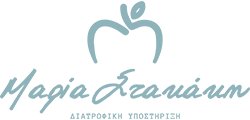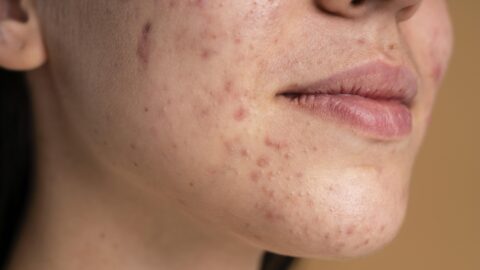Acne is a dermatological disease that affects not only adolescents but also a large percentage of adults, especially women. The causes of acne are hereditary predisposition, hormonal factors and lifestyle. Lifestyle elements that affect acne are the quality of the diet, stress and inadequate skin care.
In the last five years, data from many studies documenting the relationship between acne and diet have begun to accumulate. Diet affects key mechanisms of acne based on the secretion of insulin, androgens and other growth factors.
General dietary rules
Which foods should be avoided:
• Dairy products
Studies have shown that frequent consumption of milk can worsen the symptoms in cases of severe acne. This relationship between dairy products and acne does not seem to be due to dairy fats, but to various hormones, which may not be destroyed by milk processing, as well as to the production of growth hormone by milk consumption. Growth hormone has been linked to the production of androgens in women, which contribute to acne.
The adverse relationship between dairy and acne has not been observed with fermented dairy products (yogurt and cheese) perhaps because the bacteria in the fermentation use IGF-1 (insulin growth factor 1), leaving little for absorption.
• Foods with high glycemic load
All processed flours and their products (white bread, pasta and pies, white sugar, sweets with flour and sugar (eg cakes, pastes, syrups), white rice, potatoes as well as ready-made juices or beverages with added sugar.
• Foods associated with inflammation
All ready meals (junk food) that are cooked with poor quality oil and are rich in trans fats, such as french fries, meats rich in fat (gyros, ribs, schnitzel), foods with sour cream, etc.
• Processed foods
There is evidence to suggest a link between processed foods and acne. Eating a large meal of processed foods produces a large amount of insulin. A large amount of insulin means increased tissue growth and androgen production, which contribute to the development of acne. Highly processed foods such as ready meals often contain ingredients that promote oxidative stress and inflammation. Oxidative stress and inflammation almost always contribute to chronic disease.
Foods to eat when treating acne:
1. Milks from plant sources (rice milk, almond milk, etc.).
2. Low glycemic foods (legumes, oily, nuts, vegetables, lean meats, fish, chicken and whole grains.
3. Foods that contain ingredients that help treat acne:
4. Vitamin A: It is the vitamin that helps the smooth regeneration of the skin. Also, the main ingredient of Accutane, a "strong" anti-acne drug. Contains: In fish oils (salmon), carrots, spinach and broccoli.
5. Vitamin B5 (Pantothenic acid): Lack of pantothenic acid is associated with acne. Pantothenic acid reduces the function of the "production plants" of the oil of the sebaceous glands. Pantothenic acid is used for the production of coenzyme A (CoA), which plays a central role as a cofactor of enzymes involved in the metabolism of lipids, carbohydrates, proteins as well as gluconeogenesis. Vitamin B5 is essential for the normal function of the epithelium, is well absorbed by the skin and stimulates cell proliferation in the skin but also has good cosmetic and healing properties and is therefore found in many useful cosmetics. Sources: Whole grains, mushrooms, nuts, salmon, chicken, whole grains.
6. Zinc: People with acne have been found to have lower-than-normal zinc levels. Zinc helps prevent acne by creating an inhospitable environment for the growth of its bacteria, while relieving the skin from flares. Contained: In turkey, seafood, nuts such as almonds and wheat germ.
7. Vitamins E and C: Antioxidant vitamins E and C have the property of calming the skin, while they "work" better synergistically, when consumed together. Vitamin C is contained in: Oranges, lemons, grapefruit, papaya and tomatoes. Vitamin E is found in: Sweet potatoes, almonds, walnuts, olive oil, sunflower seeds, avocados, broccoli and leafy green vegetables.
8. Selenium: Selenium has antioxidant properties that protect the skin from free radicals (learn more about free radicals here), while research shows that in combination with vitamin E it can help heal acne. Contains: Wheat germ, tuna, garlic, almonds, Brazil nuts, eggs and black rice.
9. omega-3 fatty acids: These inhibit certain molecules that lead to inflammation and skin problems, while at the same time supporting the normal regeneration of the skin. Contained in: Fish such as salmon and sardines, flaxseed oil, walnuts, sunflower seeds and almonds.
Gastrointestinal health
Poor gastrointestinal health is just as important as acne. Unprocessed foods, soluble and insoluble fiber, omega 3 fatty acids, coconut, and vegetables such as broccoli, cauliflower, Brussels sprouts, cabbage, etc., can have a beneficial effect on intestinal health, improving its motility. Fiber can also bind and secrete excess hormones that contribute to acne. Try eliminating wheat, dairy and sugar for a month and see if it helps. All of these aggravate gastrointestinal problems and acne is highly associated with gluten-induced enteropathy.
Probiotics & Prebiotics
Probiotics are living microorganisms that can have positive effects on human health as they improve the microbial balance of the gut. Prebiotics are non-absorbable components of food (mainly fiber) that stimulate the growth and increase of activity of one or certain species of bacteria in the large intestine, thus improving the health of their human host. This is especially important for those who have used antibiotics for acne
Our gut is home to an innumerable set of bacteria, and if our gut health is disrupted it has a negative effect on acne and more. Adequate intake of prebiotics and probiotics from food or even dietary supplements can help restore gut health and reduce acne. Epidermal cells have also been shown to function as defense cells which indicate an overactive immune system. Inflammation of the skin means inflammation in the body and possibly inflammation in the intestine. The main probiotic foods are probiotic yogurts, kefir, cheeses, sourdough bread and pickles while prebiotics are elements of fruits, vegetables or cereals (such as radish, onion, garlic, whole grains, banana or soy).
Water
Water helps the body hydrate and keep the skin healthy. Adequate hydration also helps eliminate toxins that cause skin problems, while it is important for metabolism and skin rejuvenation. Eight glasses of water a day is enough for good hydration, while, of course, athletes and those who live in hot climates need more.
Green Tea
Green tea can suppress enzymes and androgens involved in acne formation. It is also anti - inflammatory
Aside from the overactive sebaceous glands and stress, it seems that poor nutrition and obesity are aspects of the modern lifestyle associated with acne. Sebum secretion by sebaceous glands can be improved by changes in diet, personal hygiene and lifestyle.

